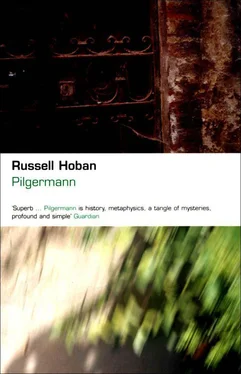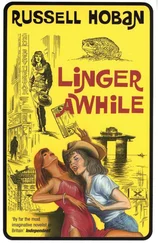Russell Hoban - Pilgermann
Здесь есть возможность читать онлайн «Russell Hoban - Pilgermann» весь текст электронной книги совершенно бесплатно (целиком полную версию без сокращений). В некоторых случаях можно слушать аудио, скачать через торрент в формате fb2 и присутствует краткое содержание. Год выпуска: 2002, Издательство: Bloomsbury Publishing PLC, Жанр: Современная проза, на английском языке. Описание произведения, (предисловие) а так же отзывы посетителей доступны на портале библиотеки ЛибКат.
- Название:Pilgermann
- Автор:
- Издательство:Bloomsbury Publishing PLC
- Жанр:
- Год:2002
- ISBN:нет данных
- Рейтинг книги:5 / 5. Голосов: 1
-
Избранное:Добавить в избранное
- Отзывы:
-
Ваша оценка:
- 100
- 1
- 2
- 3
- 4
- 5
Pilgermann: краткое содержание, описание и аннотация
Предлагаем к чтению аннотацию, описание, краткое содержание или предисловие (зависит от того, что написал сам автор книги «Pilgermann»). Если вы не нашли необходимую информацию о книге — напишите в комментариях, мы постараемся отыскать её.
Pilgermann — читать онлайн бесплатно полную книгу (весь текст) целиком
Ниже представлен текст книги, разбитый по страницам. Система сохранения места последней прочитанной страницы, позволяет с удобством читать онлайн бесплатно книгу «Pilgermann», без необходимости каждый раз заново искать на чём Вы остановились. Поставьте закладку, и сможете в любой момент перейти на страницу, на которой закончили чтение.
Интервал:
Закладка:
Dawn has not yet come but everything is Now and the actuality of it illuminates the night in my eyes so that I seem to see whatever is before me in the purple-blue crystalline vibrations in which I first saw the upside-down body of the tax-collector in the little wood of night.
Dim and yellow against the vibrations of the purple-blue shudders the faltering light of a lantern that stands on the tiles of Hidden Lion. And here is Questing the death-hound, here is Elijah for whom Firouz has opened the door, here is Messiah following on Elijah, here is the giant Bohemond foul and stinking with excrement that stains his scarlet cross as he stands on Hidden Lion lifting his sword vertically with both hands and plunging it down again and again like a man breaking ground for a post-hole. All around him are broken tiles and among them are heaped the gold and silver coins that were mortared into the tiles.
Now I see what I have seen before in the darkness and the brightness in my mind, I see leaping and still like a butterfly transfixed by lightning the elegance of Bembel Rudzuk as he attacks Bohemond; I see the great Frankish sword that has been going up and down like a post-hole digger suddenly leap like a live thing as Bohemond shifts his grip and now a track of brightness horizontally cleaves the darkness, cleaves the purple-blue, cleaves with its savage arc the body of Bembel Rudzuk; now in two pieces falls the body of Bembel Rudzuk to the broken tiles of Hidden Lion.
Here now before me is Bohemond. This is the great moment when I shall see the face of this man who has become my world and my Jerusalem. His fouled and stinking mail shirt glitters in the purple-blue luminosity of Now, his helmet flashes as if wreathed in lightnings; the iron nasal of his helmet makes other than human this face that I strain to see but I cannot, I shall never see it, I see instead the face of that veiled owl of my childhood.
I raise my arm, I strike with my sword, I see it shatter like shards of ice as the great sword of Bohemond makes a rainbow in the night, in the dawn that is coming. I stare into the brilliance, I see the Virgin and the Lion wheeling in the darkness, in the light. I see the sun-points dazzling on the sea, the alchemy of the triangular sail changing from the hot and dry to the cold and wet; I smell the salt breath of Bruder Pförtner.
But I cannot see Bohemond in this night and dawn of brilliance, of purple-blue luminosity. No, as the great sword makes another rainbow in the pale dawn where hangs the new moon of Tammuz, the last thing that I see with my mortal eyes, very, very high in the sky and circling in the overlapping patterns of the Law, is that drifting meditation of storks that I have known from my childhood, each year returning in their season to their wonted place.
Quotes and References
All Old Testament quotes except those on pp. 61, 62,112 and 113 are from The Holy Scriptures, Jewish Publication Society of America, 1955. The quotes on pp. 61 and 62 are from The Jerusalem Bible, Koren Publishers, Jerusalem, 1977. The quote on pp. 112 and 113 is from The Septuagint Version of the Old Testament in Greek and English, translated by Sir Launcelot Lee Brenton, Samuel Bagster and Sons, London.
All New Testament quotes are from The Interlinear Greek-English New Testament translated by Reverend Dr Alfred Marshall, Samuel Bagster and Sons, London, 1958.
All Quran quotes are from The Holy Quran, translated and with commentary by A. Yusuf Ali, Sh. Muhammad Ashraf, Kashmiri Bazar, Lahore, Pakistan, 1977.
Page 11. Deuteronomy 6:4
12. Genesis 15:17,18
19. Deuteronomy 6:4 Mourner’s Kaddish, p. 80, The Authorised Daily Prayer Book of the United Hebrew Congregations of the British Commonwealth of Nations, translated by Rev. S. Singer, Eyre and Spottiswoode, London, 1962 Morning Service, ibid. p. 9.
19,20. Selichot for the First Day, pp. 18, 19, Selichot, Authorised Hebrew and English Edition for the Whole Year, translated and annotated by Rabbi Abraham Rosenfeld, The Judaica Press, New York, 1979.
22. Hebrews 12:18-21
24. Morning Service for the Ninth of Av, pp. 77, 78, Kinot, Authorised for the Ninth of Av, translated and annotated by Rabbi Abraham Rosenfeld, The Judaica Press, New York, 1979.
25. The fig tree: see Matthew 21:19, Mark 11:13 Matthew 19:12
37. Matthew 10:29
39. John 11:25, 26 Matthew 27:25
40. John 11:25
41. The Shechinah: The Divine manifestation through which God’s presence is felt by man’, Gateway to Judaism, Volume One, p. 300, by Albert M. Shulman, Thomas Yoseloff, 1972
43. Matthew 27:22, 24, 25
48. Psalm 8:4
52. Mourner’s Kaddish, p. 80, The Authorised Daily Prayer Book, op. cit.
61. Deuteronomy 32:18
62. Deuteronomy 32:15-18
70. Mark 14:22
71. John 13:26, 27 Mark 14:22
72. John 11:48, 50-3
73. Matthew 26:50 Luke 22:48
74. Luke 22:48 Matthew 26:50
75. Mark 14:67, 68
76. Matthew 27:24
86. Jeremiah 2:24
94. Full quittance: see Ruth, p. 15, Volume Four, The Midrash Rabbah, edited by Rabbi Dr H. Freedman and Maurice Simon, The Soncino Press, London, 1977. This part is translated by Rabbi Dr L. Rabbinowitz.
95. Isaiah 26:19
106. The red heifer: see Numbers 19.
108. Abraham and the fiery furnace: see Genesis p. 311, Volume One, The Midrash Rabbah, op. cit. The sulphur-mercury process: see pp. 89, 90, Islamic Cosmological Doctrines by Seyyed Hossein Nasr, Thames and Hudson, London, 1978.
112. Psalm 137:5 Esaias 56:3–5, The Septuagint Version of the Old Testament , op. cit.
113. Isaiah 56:5 Bembel Rudzuk’s remark about the pattern going on for ever: this derives from Richard Ettinghausen’s caption on p. 72 of his Chapter Two, ‘The Man-Made Setting’, in The World of Islam, edited by Bernard Lewis, Thames and Hudson, London, 1976.
129. Tower Gate’s reference to the Quran: see Sura 4:79, The Holy Quran, op. cit.
132. Deuteronomy 23:2
133. The castration of Noah: See Genesis, pp. 291, 293, Volume One, The Midrash Rabbah, op. cit. The Genesis volume is translated by Rabbi Dr H. Freedman.
135. The she-camel: see Suras VII, 73-9; XI 61-8; XXVI 141-59; XXVII 45–53, The Holy Quran, op. cit.
162. Genesis 21:17–18 Genesis, p. 473, Volume One, The Midrash Rabbah, op. cit.
175. Ezekiel 24:6-9
177. Hebrews 1:11-12
177-179. Sura 81:1-14, The Holy Quran, op. cit.; see notes 5973, 5974.
196. Bohemond and the stirrup: see Chapter I, Medieval Technology and Social Change by Lynn White Jr, Oxford University Press, 1962.
207. Timaeus, 57E, Plato, the Collected Dialogues, edited by Edith Hamilton and Huntington Cairns, Bollingen Series LXXI, Princeton University Press, Princeton, New Jersey, 1961.
212. Malachi 3:1–2 I Kings 19:10
214. The new-moon formula is from p. 310, Volume One, Gateway to Judaism, op. cit.
220. The lines from ‘Inanna’s Descent’ are from p. 159, History Begins at Sumer by Samuel Noah Kramer, Doubleday Anchor Books, New York, 1959.
233. The farthest lote-tree: see Sura LIII 14–18, and note 5093, The Holy Quran, op. cit: ‘… the farthest Lote-tree marked the bounds of heavenly knowledge as revealed to men, beyond which neither angels nor men could pass.’
Wherever I have used a particular idea (as opposed to general information) from someone else I have acknowledged it in the above list. The idea network, however, is such that I sometimes think that emanations or idea pheromones may well reach out from unread pages to connect with the mind that wants to connect with them; for that reason I shall list here two books that I have only turned the pages of but I am well aware that even chapter headings and picture layout can move the mind one way or another; one is A Study of Vermeer by Edward A. Snow (University of California Press, Berkeley, 1979). The elegance of the production of this book, the quality and choice of reproductions, and the general layout are so finely tuned to the spirit of the painter that it cannot fail to sensitize and stimulate even the unreader. The other is The Prophet Elijah in the Development of Judaism by Aharon Wiener, in the Littman Library of Jewish Civilization series (Routledge & Kegan Paul, London, 1978). It seems to me that just glancing at random lines in Wiener’s text made Elijah, all strange and wild and falling apart with the power that possessed him, leap newly vivid into my mind where a place had already been prepared for him not only by the Holy Scriptures but also by a song that I heard in a shortwave broadcast from Israel: Eliyahu, sung by Mordechai Ben David (the LP is ‘Moshiach is Coming Soon’, Aderet Records). This Sabbath-night song was translated for me in Jerusalem the Golden, the shop in Golders Green where I bought the record, by Alan Cohen, a stranger whose help I sought; he did it with a spontaneous enthusiasm that seemed to arise from the very essence of Elijah, the quintessential, the engodded stranger.
Читать дальшеИнтервал:
Закладка:
Похожие книги на «Pilgermann»
Представляем Вашему вниманию похожие книги на «Pilgermann» списком для выбора. Мы отобрали схожую по названию и смыслу литературу в надежде предоставить читателям больше вариантов отыскать новые, интересные, ещё непрочитанные произведения.
Обсуждение, отзывы о книге «Pilgermann» и просто собственные мнения читателей. Оставьте ваши комментарии, напишите, что Вы думаете о произведении, его смысле или главных героях. Укажите что конкретно понравилось, а что нет, и почему Вы так считаете.












